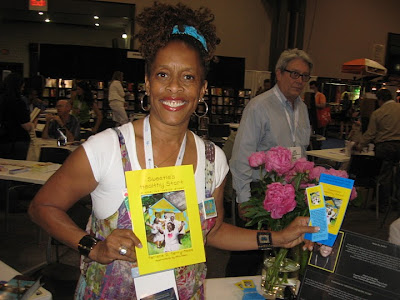
Prolific poet and novelist
Tanure Ojaide and two other Nigerians have been shortlisted for the
Inaugural Penguin Prize for African Writing. The other Nigerians are Chika Ezeanya in the fiction category and Pius Adesanmi in the non-fiction category.
The following is a detailed report from Penguin Books in South Africa.
Penguin Books South Africa is delighted to announce the shortlists for the inaugural Penguin Prize for African Writing.
Having received approximately 250 submissions in the fiction category and 50 in the non-fiction category from countries all over Africa, Penguin Books South Africa is pleased to announce the names of the shortlisted authors for the inaugural Penguin Prize for African Writing. This award seeks to highlight the diverse writing talent on the African continent and make new African fiction and non-fiction available to a wider readership.
The shortlisted authors for the Penguin Prize for African Writing are:
Fiction
Ellen Aaku (Zambia)
Moraa Gitaa (Kenya)
Chika Ezeanya (Nigeria)
Shubnum Khan (South Africa)
Isabella Morris (South Africa)
Mũkoma wa Ngũgĩ (Kenya)
Non-fiction
Pius Adesanmi (Nigeria)
Andrew Barlow (South Africa)
Ruth Carneson (South Africa)
Ahmed Mortiar (South Africa)
Tanure Ojaide (Nigeria)
Anli Serfontein (South Africa)
Tebogo Tlharipe (South Africa)
These manuscripts have been sent to the judges and the winners will be announced on Saturday 4 September 2010 at the Mail and Guardian Literary Festival. The prize in each category will be R50 000 and a publishing contract with Penguin Books South Africa, with worldwide distribution via Penguin Group companies.
About the judges
Fiction
Kole Omotoso
Kole Omotoso was born in Nigeria in 1943. After studying in Nigeria, he obtained a doctorate on contemporary Arabic prose and dramatic writing at the University of Edinburgh. From 2001, he has been a professor in the Drama Department at Stellenbosch University, and is currently the director of the Africa Diaspora Research Group based in Johannesburg. In 2009, he was a judge for the Commonwealth Writers’ Prize Africa Region and was the keynote speaker on the festival’s opening night. He is the author of the classic historical narrative The Combat, first published in 1972 and republished in the Penguin Modern Classics series, as well as one short story collection, two plays, three books of literary criticism and several academic articles, novels and historical narratives.
Harry Garuba
Harry Garuba is the head of department and associate professor in the Centre for African Studies at the University of Cape Town. His teaching interests include: African Literature, Postcolonial Theory and Criticism, African Modernities, and Intellectuals/Intellectual Traditions of African Nationalist Writing. In addition to being an academic, he is an author and poet, and with an active interest in African and postcolonial literatures, has been a member of the editorial advisory board of the Heinemann African Writers Series.
Elinor Sisulu
Elinor Sisulu was born in Zimbabwe. She studied in her home country as well as in Senegal and the Netherlands. As an academic researcher for the Ministry of Labour in Zimbabwe in the early eighties, she published studies of women’s work and development assistance in Zimbabwe. This included a major study for NORAD that was later published by SAPES in a book entitled Women in Zimbabwe. From 1987 to 1990 she worked for the International Labour Organisation on assistance programmes for the ANC, PAC and SWAPO. In 1991, Elinor moved to Johannesburg and until 1998, worked as a freelance writer and editor, and as assistant Editor for SPEAK, a black feminist publication.
Her children’s book, The Day Gogo Went to Vote, a story about a child accompanying her grandmother to vote in the 1994 elections, won numerous awards, including the African Studies Association of America Best Children’s Book Award, and has been translated into 6 major South African languages. Her biography of Walter and Albertina Sisulu, Walter and Albertina Sisulu: In Our Lifetime, was published in 2002 and was runner up in the Sunday Times Alan Paton Award, and was awarded the NOMA Award for most outstanding book published in Africa in 2003. Elinor Sisulu is currently advising on projects on democracy and human rights in Zimbabwe.
Non-fiction
Redi Direko
Redi Direko was born in Soweto, Johannesburg. She studied for her first degree in Journalism and Communications, and English Literature at post-graduate level in Johannesburg. She has been a broadcast journalist for 11 years, having worked in both television and radio. She began her career as a reporter for Network Radio News and then Kaya FM, a Gauteng radio station. She went on to present a variety of programmes for the SABC and its Africa channel, where she interviewed people such as Thabo Mbeki, Tony Blair, Colin Powell, Archbishop Desmond Tutu and Nelson Mandela. She was the senior news anchor at eTV’s 24th satellite news channel, and has been a columnist for Fairlady magazine. She is currently the presenter of the Redi Direko Show on Talk Radio 702 and 567 Cape Talk and writes a weekly socio-political column for the Sowetan newspaper, while studying for her Master’s in Literature.
Nic Dawes
Nic Dawes has worked for the Mail & Guardian from 2004. Dawes joined the newspaper as associate editor from ThisDay newspaper. As an investigative and political reporter with editing duties, he was part of the team that broke the story linking police chief Jackie Selebi to the underworld networks surrounding Brett Kebble, and also contributed extensive news and analysis on politics and economic policy. He is now the editor-in-chief of the Mail & Guardian weekly, and Mail & Guardian Online.
Jonathan Jansen
Jonathan Jansen is honorary professor of education at the University of the Witwatersrand and Scholar-in-Residence at the Oprah Winfrey Leadership Academy for Girls in Johannesburg. He has worked as a high school science teacher and served as the dean of education at the University of Pretoria from 2001-2007. He obtained his MS in science education at Cornell University and his PhD from Stanford University as a Fulbright Scholar, and is widely regarded as one of the top researchers in the field of education.





